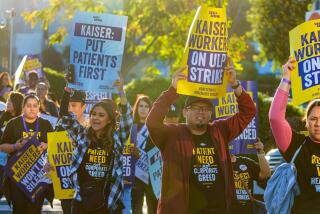Health Care Reform Could Endanger Jobs, Experts Warn : Medicine: Industry is the only sector of the economy that is still growing. Cutbacks can have ripple effects throughout communities.
- Share via
WASHINGTON — The rising nationwide clamor to cut health care costs contains a painful paradox that President Bush and members of Congress must confront: The health care industry is the only major sector of the ailing economy that continues to grow, and efforts to reduce spending could end up costing jobs.
The industry’s importance to the nation’s economy was underscored Friday when the Bureau of Labor Statistics reported that the number of jobs in health services increased by 395,000 in 1991, while the nation lost 663,000 jobs overall.
Government figures also show that nearly 8% of the nation’s non-agriculture workers are in health services, including doctors, nurses, hospital administrators, physical therapists, pharmacists, technicians, orderlies, consultants and analysts. And the nation’s 8.5 million health care workers account for more than 12% of the gross national product, or nearly $700 billion annually.
“Health care is a very labor-intensive endeavor,” said Ed Howard, executive vice president of the Alliance for Health Reform. “What’s bureaucratic waste to one person can be another person’s paycheck.”
But the rapidly rising cost of health care has fueled demands for reform.
Bush unveiled a package of proposals Thursday, including tax breaks, that he said would help curb costs and extend coverage to 35 million uninsured Americans. Democrats in Congress also have introduced reform plans that promise similar results but use different approaches.
One of the President’s proposals would standardize and automate the various insurance billing systems, which account for $79.8 billion annually in administrative costs. But as Lisa Sprague, a health policy analyst at the U.S. Chamber of Commerce, noted: “We’d all like to see less paper-pushing, but there are people who do those functions.”
Caught in the middle of such proposals are the health care workers. They now make up more than 10% of the work force in some cities, said Richard Devens, a senior economist at the Bureau of Labor Statistics.
“They are certainly a growth sector, but the last thing we need are more doctors,” said Harvey I. Sloane, a physician and director of Health Care for America, a group that supports national health insurance. “We need to restructure the manpower in health care.”
One reason for the growth in health care jobs in recent years is the explosion of medical technology, which has created demands for more skilled personnel.
“We’re far and away the world’s most innovative country in terms of new pharmaceuticals, medical devices, biotechnology and diagnostics,” said Wayne Roe, chairman of Health Technology Associates Inc. in Washington, a business consulting firm. “And that employs a lot of people.”
The relatively new diagnostic tool called magnetic resonance imaging, for example, requires specially trained doctors and technicians to operate it and skilled mechanics and engineers to maintain it, Roe said.
“The more sophisticated the tools become, the more they may require additional doctors and support personnel,” he added.
The health care industry has helped offset the U.S. trade deficit with exports of medical technology and pharmaceuticals, which consistently are among the nation’s largest trade surpluses.
Another reason for the increasing number of workers in health services is the aging of the population. “As the population ages, there is more demand for health services,” said William Barron, acting commissioner of the Bureau of Labor Statistics.
In many communities today, hospitals are the largest employer, said Samuel Davis, a health care consultant and former chief executive officer of New York’s Mt. Sinai Hospital.
The economic impact of the health care industry on a community can be illustrated in towns throughout Texas, which leads the nation in hospital closings, industry officials say.
When Golden Plains Community Hospital in Borger, Tex., closed in 1988, it not only put 130 people out of work but also indirectly threatened the jobs of 3,000 other residents of the small Panhandle town.
Borger’s largest employer, Phillips Petroleum Co., considered relocating because company officials said they did not feel comfortable having workers in a community with inadequate medical services. The hospital closing also affected the businesses of doctors, ambulance services, pharmacies, X-ray labs and technicians.
More to Read
Sign up for Essential California
The most important California stories and recommendations in your inbox every morning.
You may occasionally receive promotional content from the Los Angeles Times.













